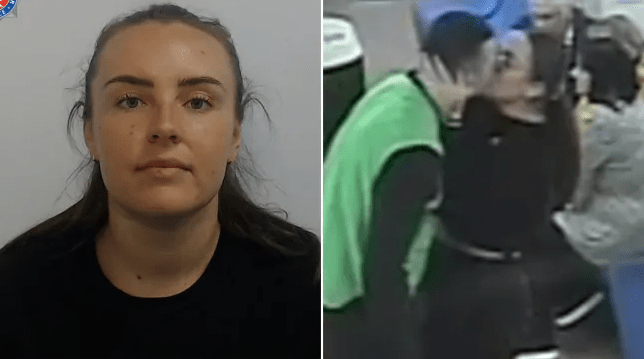A Greater Manchester Police officer has been jailed after she was caught on CCTV kissing an inmate during a visit, while in uniform, exposing a web of corruption that saw her leaking confidential information to convicted criminals.
Choni Kenny, 27, was caught on prison security cameras tenderly kissing Josh Whelan, a known drug dealer, during a visit to Forest Bank Prison in Salford. She was in full uniform at the time.
This brazen act, which took place while Whelan was behind bars between 2021 and 2023, became a key piece of evidence in the case against her. The footage ultimately helped to bring her to justice. Earlier this week, Kenny was sentenced to three years and nine months in prison for her offences.

Alan Richardson from the Crown Prosecution Service condemned Kenny’s actions, stating she was “trusted to uphold the law and protect the public.” “Yet her conduct fell far below this when she became involved with two known criminals,” he added.
Kenny joined the force in 2020. But her professional duties were cast aside when she began a romantic relationship with Whelan during his incarceration. She smuggled in mobile phones – twenty in total – to help him run a drug operation from inside prison walls.
“You were helping him to supervise that operation from prison,” said Judge Neil Flewitt KC during sentencing.
Beyond contraband, Kenny also supplied Whelan with classified police information. One of the most alarming breaches included handing him a victim impact statement in a case where he was accused of assaulting a former partner.

Even after Whelan’s release, the illicit relationship continued. They were seen together in Kenny’s BMW and dining at Nando’s in November 2022. Around the same time, she accessed police databases to check on recently released inmates.
Alexander Beevers, defending Whelan, claimed: “His co-defendant liked that aspect of his character… she was willing to make use of that status.”
Kenny’s misconduct didn’t stop there. She later became involved in a physical but “casual” relationship with Rahim Mottley, a former schoolmate and another known offender. At the time, Mottley was under investigation and had moved to Spain.

During their affair, Kenny used police systems to look up details of the case against Mottley. She tipped him off about a planned firearms raid and even promised to identify police informants – a deeply dangerous betrayal of her role.
Mottley was extradited back to the UK in October 2024, following his arrest by the National Crime Agency.
The judge noted that while Kenny didn’t benefit financially, her crimes were serious.
“Your actions were not motivated by a desire for a financial or other advantage or borne out of any malice,” he said. “They were a consequence of your naivety, immaturity, and wish to maintain the friendship of Josh Whelan and Rahim Mottley.”
Detective Chief Superintendent Mike Allen didn’t mince words after sentencing. “Kenny’s actions plainly amounted to serious corruption. It is right that she now contemplates her future from behind the bars of the prison estate where she is now incarcerated.”
Chief Constable Stephen Watson echoed the sentiment, saying: “Her accessing and sharing police data with active criminals is a tangible manifestation of a distinct lack of integrity, decency and moral fibre.”
Kenny was dismissed from the force on 1 April following an accelerated misconduct hearing.
Sentences Handed Down
- Choni Kenny, of Cheadle, Greater Manchester, admitted four counts of misconduct in public office and one count of conspiracy to commit misconduct. She was jailed for three years and nine months.
- Josh Whelan, of no fixed address, admitted various offences, including possession of contraband in prison and racially aggravated assault. He was jailed for two years and eight months.
- Rahim Mottley, also of no fixed address, pleaded guilty to conspiracy to commit misconduct and received a two-year, four-month sentence.
This shocking breach of trust by a serving officer has raised serious concerns about integrity within the police force. While justice has been served, the case highlights the critical importance of safeguarding sensitive information and the devastating consequences when that trust is broken.






